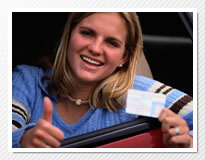Distracted, Drunk & Drugged Driving
Your primary responsibility as a driver is to operate your motor vehicle and to do so safely! Driving while distracted, drunk or under the influence of other drugs is a leading cause of accidents and traffic fatalities for teens.
Many teens (and adults) recognize that driving under the influence is dangerous. However, many people fail to recognize the danger of driving while distracted, especially if they try to talk or text on a cell phone. Drivers who use hand-held devices while driving are four times as likely to get into crashes serious enough to injure themselves or others.
“It Can Wait”
Watch on YouTube: https://www.youtube.com/watch?v=VFmQNjbFEFY
Everyone has a personal responsibility to pay full attention while driving and to realize that calls or texts can wait. Check out the "It Can Wait,” music video by American Idol-finalist Travis Tucker, a former teacher in Prince William County. Pass along the link to this video through Facebook, You Tube, Twitter, and other social media and let your friends know that “It Can Wait.”
With more portable technology now than ever, driver distractions have risen to unprecedented numbers. We live in a world where people expect instant, real-time information 24 hours-a-day and those desires do not stop just because people get behind the wheel. Drivers simply do not realize the dangers that are posed when they take their eyes and minds off the road and their hands off the wheel and focus on activities other than driving.
Know the Laws Concerning Cell Phones!
It is illegal for all drivers in Virginia to hold a handheld personal communications device (e.g., a smart phone) while driving a moving motor vehicle. For drivers under age 18, Virginia law prohibits using any cellular telephone or any other wireless telecommunications device, regardless of whether such device is or is not hand-held. If you are under age 18, you can only use a cell phone or any other device:
- for a driver emergency;
- when the vehicle is lawfully parked or stopped.
Alcohol, Other Drugs and Driving
Alcohol and other impairing drugs are involved in approximately 40 percent of all traffic crashes in which someone is killed each year. If you drink alcohol or use other impairing drugs and drive, even a little, your chances of being in a collision are much greater than if you did not drink any alcohol or use any other drugs.
If you are younger than 21 it is illegal to purchase, publicly possess and drink alcoholic beverages. Alcohol and other impairing drugs affect a person’s ability to perceive surroundings, react to emergencies and skillfully operate a motor vehicle. For new drivers learning complex skills, the effects of alcohol and other impairing drugs are greater. All States have “zero tolerance” laws (no alcohol in the circulatory system) for drivers under 21.
Know the Laws Concerning Drinking and Driving!
Teens who drink alcohol and drive will lose their driver's license for a year and receive either a $500 minimum fine or 50 hours of community service. The law provides a “zero tolerance'” stance against underage drinking and driving, said Virginia Department of Motor Vehicles’ Commissioner Richard D. Holcomb, the Governor's Highway Safety Representative. Zero tolerance means the legal limit for teens is a .02 percent blood alcohol concentration (BAC), which is the normal alcohol content of the average person. Even a small amount of alcohol can result in a conviction.
Never let friends or relatives drive if they have been drinking. If a friend or relative has been drinking:
- take his/her keys away
- arrange for a driver who has not been drinking
- call a cab; or
- have them stay overnight
There is no way to get all the alcohol or other drugs out of the circulatory system in order to become sober quickly. Coffee, fresh air, cold showers or eating will not help to remove the alcohol or other drug combination from the circulatory system. Time is the only medically-proven method to remove alcohol or other drug combinations from the circulatory system. It takes about an hour for the body to get rid of one normal drink from the circulatory system.
Therefore, if someone has had four normal drinks, the person should wait four hours or more before driving. Keep in mind that “sober” means that no alcohol or other impairing drugs are in the circulatory system of the body.
The best advice is to not drive a vehicle of any kind if alcohol or other drugs are consumed. Impairment starts with the first drink. Even one drink of alcohol can affect a person’s ability to operate a motor vehicle. With one or more drinks in the bloodstream a person could be arrested for driving under the influence of alcohol or other drugs.
Links
Governors Highway Safety Association (GHSA)
http://www.ghsa.org/html/stateinfo/laws/cellphone_laws.html
Students Against Destructive Decisions
http://www.sadd.org/
Youth of Virginia Speak Out (YOVASO)
http://www.yovaso.org/
